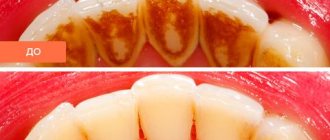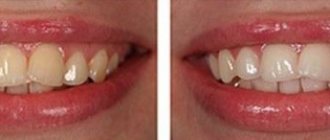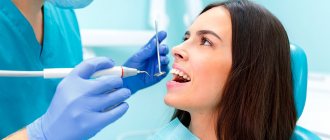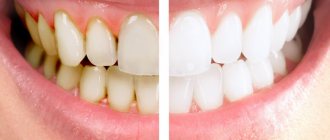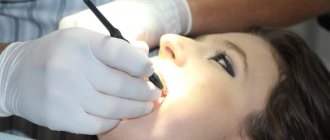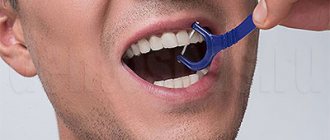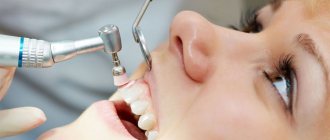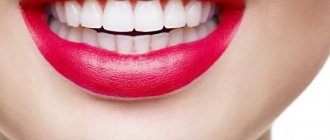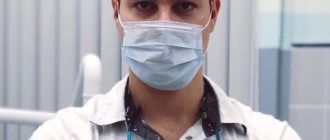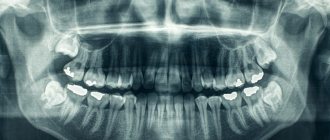Professional dental hygiene for children is the best prevention of caries
Everyone knows that poor dental care is the main cause of caries and a number of other diseases. But even among adults there are many people who do not pay due attention to oral hygiene. What can we say about children who simply have not yet learned how to properly care for their teeth. In addition, they experience additional difficulties due to the loss of baby teeth and the eruption of new ones.
At the same time, it is in childhood that keeping teeth clean is especially important, since tooth enamel is still fragile and vulnerable to carious lesions. Therefore, professional dental hygiene for children is simply necessary - this is the only way to ensure oral health. If you want your child to not have pain in his baby teeth, but to have strong permanent teeth to replace them, bring him to the Natadent clinic.
Indications for children's oral hygiene
A small child is not able to effectively clean teeth from plaque and microorganisms.
He also cannot floss properly, causing food debris to accumulate in the spaces between his teeth. With the participation of parents, the effectiveness of the procedure increases, but it is better to entrust the cleaning to a professional. The reasons for visiting a doctor are:
- presence of tartar deposits;
- the presence of hard or soft plaque;
- inflammatory gum diseases;
- prevention of dental diseases.
Professional cleaning helps prevent the development of caries, stomatitis, pulpitis, periodontitis, gingivitis and papillitis. It helps remove microorganisms from the oral cavity that affect the functioning of organs and systems.
Contraindications for the procedure are:
- inflammation of the oral mucosa (stomatitis);
- fragile and thin tooth enamel;
- hypoplasia or erosion of enamel;
- allergic reaction to the drugs used;
- acute infectious diseases.
Why is professional hygiene necessary?
Children's teeth cleaning in dentistry is performed by experienced doctors who know exactly what is necessary for oral health. The procedure performed by a specialist solves a number of important problems:
- prevents the development of caries and periodontal diseases;
- instills in the child a calm attitude towards the dental chair;
- plays a role in the correct formation of permanent occlusion;
- accustoms the child to comprehensive oral hygiene.
This is also an excellent reason to conduct an extraordinary examination of the oral cavity and make sure that everything is fine with the child. The child will be pleasantly surprised that the visit to the dentist was not accompanied by unpleasant procedures, and will no longer be afraid of the dental chair.
Professional teeth cleaning for children provides a number of significant benefits, such as:
- high-quality and complete cleaning of all surfaces;
- cleaning the periodontal sulcus and other hard-to-reach places;
- after professional cleaning and polishing, it is more difficult for bacteria to gain a foothold on the surface of the teeth;
- the procedure involves a careful examination of the oral cavity, guaranteeing the detection of caries and other diseases in the early stages;
- there is no risk of damage to the enamel.
By contacting the Natadent children's dental clinic, you will receive all the benefits listed above. Our doctors have a high level of qualifications and use modern tools to reduce the baby’s discomfort to a minimum.
OPTIMAL AGE
Oral care should begin even before the first baby tooth appears, since during feeding, microorganisms that cause candidiasis and stomatitis enter the mucous membrane. Therefore, it is best to carry out the first “cleaning” at 2-3 months. This early care will include cleaning the gums and uvula with a gauze pad or a special dental fingertip.
When the baby is 6 months old, his ejection reflex becomes weaker, so other devices can be used:
- finger brushes;
- children's toothbrushes with soft bristles.
The first lessons on self-cleaning can be held a year, and the baby should fully master this process by 2 years. From 2-3 years old, it is permissible to use a special children's toothpaste that is safe in case of accidental ingestion, preferably without fluoride. Starting from the age of three, you can offer your baby an electric brush. But if a child experiences fear from vibration, then the new product should be abandoned in favor of the classic model.
How does professional teeth cleaning work for children?
Typically this procedure includes the following steps:
- The doctor meets the child, establishes contact and explains why clean teeth are so important for health.
- The teeth are coated with a special composition that allows you to better see the areas of greatest contamination.
- Using special pastes and brushes of varying degrees of hardness, the doctor thoroughly cleans each tooth.
- If hardened plaque is present, special mechanical instruments or an ultrasonic scaler are used (more gentle methods are used for baby teeth, since their enamel is quite fragile).
- The surface of the teeth can be further polished to reduce the accumulation of new plaque and make routine brushing easier.
- The teeth are treated with a fluoride-containing compound that strengthens the enamel surface.
- If necessary, the doctor may recommend deep fluoridation and fissure sealing.
There is no need to be afraid that treatment with metal instruments or ultrasound will harm healthy teeth. Modern methods of hygienic cleaning are completely safe for tooth enamel. At the same time, they ensure effective removal of hardened plaque and tartar from its surface.
Professional dental hygiene for children at the Natadent clinic includes procedures such as:
- complete cleaning of accessible and hidden surfaces of teeth;
- removal of all types of plaque and tartar;
- thorough cleaning of the periodontal sulcus and the space between the teeth;
- surface polishing;
- remineralization of enamel (treatment with preparations containing fluorine and calcium);
- self-care training for teeth.
The last point is very important, since the child must constantly keep his teeth clean. The doctor explains to him the importance of hygiene and shows him how to brush his teeth on his own, spending a minimum of time and without missing anything.
Prerequisites for the rapid formation of plaque on children's teeth
- A small amount of solid food in the child's menu - modern children gravitate towards soft food that does not require active chewing. Even fruits and vegetables are served to children in the form of purees or finely chopped.
- A large amount of sweets in a preschooler’s diet – carbohydrate foods accelerate the growth of bacteria.
- The thin enamel of baby teeth is quickly destroyed, which contributes to the strong fixation of plaque on the teeth and the spread of the film.
- Poor daily care. Preschool children themselves do not brush their teeth well, and parents do not always remember the need to control the quality of daily hygiene.
- Frequent colds and taking antibiotics worsen the bactericidal effect of saliva, which is important for the natural removal of dental plaque.
- Lack of microelements - fluorine, calcium.
Professional teeth cleaning for children of all ages
The hygiene of baby teeth is just as important as the hygiene of permanent teeth. The well-being and mood of the baby, and in the future, the formation of a correct permanent bite, with which the child will have to live his whole life, directly depends on their health. No matter how hard she tries, a mother cannot brush her child’s baby teeth thoroughly enough, so professional cleaning at this age is especially important. Using a soft brush, the doctor will carefully clean each tooth, and at the same time make sure that there is no caries or other diseases.
It is important to consider that a child develops three different bites at different times:
- milk (up to 4-5 years);
- replaceable (up to 14-15 years);
- permanent (15 and older).
From about 5 to 14 years of age, a child has both primary and permanent teeth. This combination is called a mixed bite (or mixed). The main feature of a mixed bite is that the teeth have different heights, and this complicates self-cleaning.
This is also a very important period, since it is at this age that a permanent bite is formed, with which the child will have to live his entire adult life. It is important to avoid inflammatory processes, caries and other oral diseases that can affect the growth and formation of permanent teeth.
It is important to know! Many parents are sure that their children do not develop tartar. But in the oral cavity of a child, the same processes occur as in adults, and therefore the stone is formed in the same way. It's just not as noticeable in children because they don't smoke, drink coffee or drink tea in the same quantities as adults.
By the age of 14-15, children have only permanent teeth. Usually a child at this age already knows how to clean them on his own, without missing hard-to-reach places. But it’s still worth signing him up for professional cleaning, since the doctor will be able to tell him what mistakes he’s making.
Practicing the technique
As in adults, when cleaning the outer and inner surfaces of the teeth, the brush is placed at an angle of 45 degrees to the tooth and sweeping movements are made from the gums to the edge of the tooth. To clean the chewing surface, the brush is positioned horizontally and moved in a circular motion. If you are afraid of overdoing it, watch the video on how to brush your teeth properly. They will explain and clearly demonstrate to you how it should be. The whole family can watch this video on how to brush your child’s teeth. In addition, your baby will also be interested in watching a cartoon about how other children brush their teeth.
How often do children need professional dental hygiene?
Adults are recommended to undergo this procedure once every six months. But children's teeth are much more vulnerable, their enamel is not as strong, and children themselves are often not disciplined enough to brush their teeth well on their own. Therefore, it is recommended to bring children to have their teeth cleaned 3-4 times a year. This is especially true for children, whose health needs to be continuously monitored.
3-4 months is the period during which new plaque begins to harden, making it difficult to clean with a regular brush and paste.
In some cases, hygienic teeth cleaning in a children's dental office should be carried out even more often. Certain health conditions (such as kidney disease) may cause plaque to form and harden more quickly. In this case, the doctor can prescribe an individual visit schedule. There are other reasons to carry out the procedure more often, for example, the presence of braces, which inevitably contribute to the accumulation of plaque.
Recommendations after cleaning
To consolidate the results of the procedure, the doctors of the children's department recommend:
- do not eat for 2-3 hours after cleaning;
- Do not eat rough food for 24 hours after the procedure;
- for 1-2 days, avoid eating foods containing food dyes (berries, black tea, beets, seasonings, juices);
- for 1-2 days, exclude from the diet foods that increase tooth sensitivity (carbonated drinks, citrus fruits);
- Brush your teeth 2 times a day with a toothpaste and brush recommended by your dentist.
Reviews
Cleaning a child's teeth at the dentist is an important undertaking, so it is important that it is carried out by a good specialist, and that the chosen clinic has a good reputation. Therefore, we care very much about our reputation and strive to ensure that every little patient is satisfied with the service. And how well we do this, you can judge by the reviews that we always publish unchanged.
Who will treat
Nikolskaya (Sirenko) Anastasia Vladimirovna
pediatric dentist
Experience: since 2022 Attentive, knowledgeable, talented doctor. Finds an approach to everyone, even the most timid children. He values the trust of his little patients above all else.
More details in the Personnel section
Make an appointment
Klimova Elena Alexandrovna
pediatric dentist
Experience as a pediatric dentist since 2014. Make an appointment with Elena Alexandrovna for dental treatment in children and adolescents, removal of temporary or permanent teeth, plastic surgery of the frenulum of the tongue or lip, installation of a crown, prevention of caries, sealing of teeth, etc.
More details in Personnel section
Consequences of damage to baby teeth
Insufficient quality cleaning of baby teeth or a complete lack of oral care for a child often leads to dental diseases, which in most cases cause complications.
If the rudiments of permanent teeth are damaged, the following consequences may occur:
- delayed eruption of permanent teeth;
- bite pathologies;
- eruption of “bad” teeth;
- dystopia or retention.
Lack of daily hygiene can also cause infection of the oral mucosa, diseases of the gastrointestinal tract and upper respiratory system.
